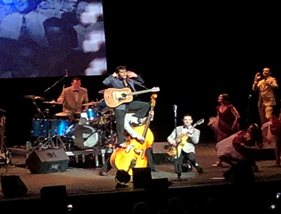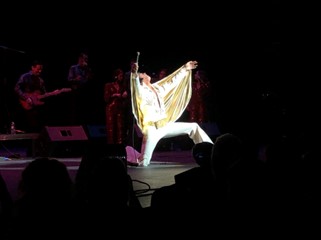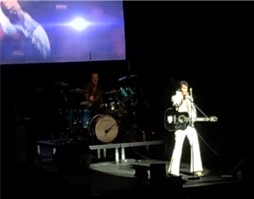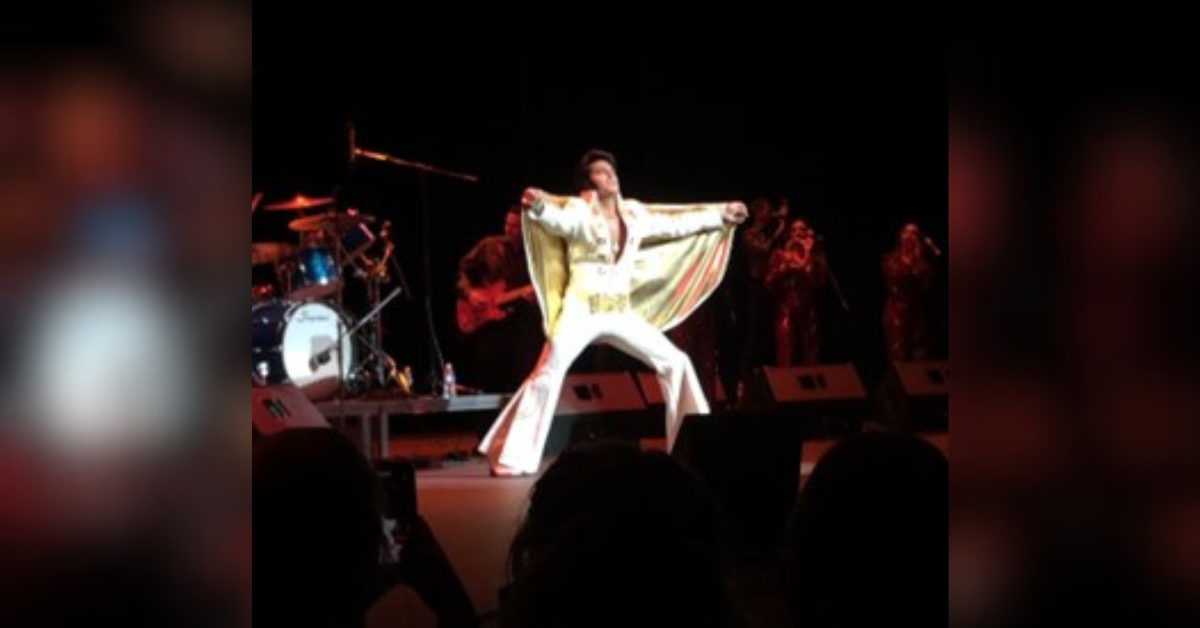It has been 47 years since Elvis Presley last walked on Lonely Street, yet for one rainy night, Dean Zeligman (aka “Dean Z”) revived his presence to a packed crowd at the Sangamon Auditorium on the UIS campus in Springfield, Illinois. The nearly two-hour show was filled to the brim with Elvis’s classic hits like “It’s Now or Never” and “All Shook Up,” each one expelling the unbridled sexuality, that would have been called the Devil’s work once upon a time. Dean Z slithered, climbed, shook and caved, all ingredients to make the audience squeal and scream. From the opening bars of “Blue Suede Shoes” to the closing notes of “Can’t Help Falling in Love,” not a soul was safe from the raw energy oozing from the stage. Yet, how did Dean Z earn such high praise in a community of impersonators that range from fantastic to distasteful?
First is to acknowledge the difference between pure mimicry and impersonation by Elvis standards – or pretending versus becoming. Elvis impersonators are those who hold the flame, attempting to recapture the swagger, the motions, and the vocal tenacity Elvis had. But therein lies the problem. Some impersonators only add a Southern drawl or inflate themselves to portray a caricature of Elvis’s later years. They only mimic the man, not the soul. Or some could take it too far and practically make themselves the man, again losing the point of being an impersonator. They either take it too far or don’t do enough.
 It takes a person willing to recognize that they are not The King, nor will they ever be. They are simply playing with the audience to create the experience of a lifetime. Dean Z threads a delicate line of knowing who he is and what he is representing. Elvis fans are a hard bunch to impress and if impersonators act – for even a second – insincerely, it will be picked up on. This humble reporter has seen dozens upon dozens of impersonators try to walk in Elvis’s shoes and can safely say Dean Z is the closest to Elvis they had ever seen.
It takes a person willing to recognize that they are not The King, nor will they ever be. They are simply playing with the audience to create the experience of a lifetime. Dean Z threads a delicate line of knowing who he is and what he is representing. Elvis fans are a hard bunch to impress and if impersonators act – for even a second – insincerely, it will be picked up on. This humble reporter has seen dozens upon dozens of impersonators try to walk in Elvis’s shoes and can safely say Dean Z is the closest to Elvis they had ever seen.
As should be mentioned, Dean Z didn’t just portray one section of Elvis’s stage life but three separate unique points, the 1950s/early 1960s, 1968, and 1972. This is a hard ask as Elvis’s voice changed as he grew older, so some singers are more suited for a younger Elvis, while some are suited for the later Elvis. Predominantly, Dean Z seemed more at ease as a 1950s/’60s Elvis as this was where a majority of the concert took place. The freedom he had using his blue jacket as a tease to the audience, swinging his legs, jumping all around. Even one time climbing upon an upright bass, playing his guitar. Coincidently, it was playing as a younger Elvis that awarded Dean Z the 2013 award for “Ultimate” tribute artist at Graceland.
Dean Z did early hits like “Don’t Be Cruel” and “Teddy Bear,” (even throwing one into the crowd) but also added in mid-1960s songs like “Bossa Nova Baby” and “Crying in The Chapel” – a healthy mix of what made Elvis iconic. A quick costume change occurred while his background singers sang “Hound Dog” in the style of Big Mama Thornton, the artist who originated the song. Dean Z came back out in a leather suit, singing songs from Elvis’s comeback special in 1968, ending the first half of the show with “If I Can Dream,” followed by a 20-minute intermission.
Now up to this point, not everything was perfect. There was a half-hour delay before opening the house doors as there were technical difficulties as explained by a public announcer, causing the lobby to be consumed by waiting patrons. Even after getting inside, someone dropped what sounded like a plastic cup of soda onto unexpecting people (more likely a box of popcorn as the patrons were unfazed). However, about five minutes later around the same spot, someone dropped a program and a large piece of paper onto the same people, prompting one of them to report it to an usher. Even later still, a loud bang occurred at the left side of the auditorium, possibly someone running into a door, but this humble reporter didn’t investigate.
As the second half started, the leading ladies behind Dean Z came out in ruby-colored sparkling jumpsuits singing “Lady Marmalade” by the group Labelle to set the mood of the 1970s. Finally, the lights turned down once more, and the classical composition “Also Sprach Zarathustra” built the tension as it did many Elvis concerts before. At the peak of the intro, it punched into a rapid drum solo with Dean Z strolling out onto the stage to rising horns in a replica of a white and gold suit Elvis wore in 1972 called the Adonis Suit. He roared into the song “See See Rider” like an angel falling from Heaven, or a specter from another plane, revving up the crowd, simply by standing there and singing. It was an impeccable experience that many of the older fans in attendance might have experienced back in the day.
He ran through songs like “Proud Mary” and “Polk Salad Annie,” but something became apparent from this humble reporter’s vantage. Dean Z was slowly becoming one of those mimicries expressed earlier. The voice tried hard to hit that old Southern sway Elvis had, pulling the suspension of disbelief out of the water. It should be said that it wasn’t from a lack of sincerity but simply trying too hard.
 However, his charisma and swagger remained, as he held the audience with every note, still shaking his upper body like crazy. It gave a stark reminder of the different eras of Elvis. From the hip-swinging rebel to a tamed tiger, how age and time always win. Dean Z tore the house down with his renditions of “Suspicious Minds” and “An American Trilogy,” with the latter being dedicated to the heroes of America such as firefighters, police, nurses, doctors and those serving in the military. But now it was time to say goodnight. Dean Z thanked the audience and his band for a fantastic crowd and performance, proclaiming he would come back if asked. As Elvis did at nearly every one of his concerts, Dean Z closed out with “Can’t Help Falling in Love.” At that moment, a few ladies a row up, who had been constantly going back and forth between the stage and their seats, went up one last time, and as it was the last song, this reporter decided to risk it and tagged along.
However, his charisma and swagger remained, as he held the audience with every note, still shaking his upper body like crazy. It gave a stark reminder of the different eras of Elvis. From the hip-swinging rebel to a tamed tiger, how age and time always win. Dean Z tore the house down with his renditions of “Suspicious Minds” and “An American Trilogy,” with the latter being dedicated to the heroes of America such as firefighters, police, nurses, doctors and those serving in the military. But now it was time to say goodnight. Dean Z thanked the audience and his band for a fantastic crowd and performance, proclaiming he would come back if asked. As Elvis did at nearly every one of his concerts, Dean Z closed out with “Can’t Help Falling in Love.” At that moment, a few ladies a row up, who had been constantly going back and forth between the stage and their seats, went up one last time, and as it was the last song, this reporter decided to risk it and tagged along.
 As he finished the song, he fell to one knee, outstretching his cape like a bird and let the music and applause waver over him as the punch of the drums returned to bow him out. He paraded up and down the stage, giving handshakes and touching fingers, humbled by the applause. As quickly as it ended, he ran off stage, leading to the immortal words “Elvis has left the building”. Overall, a fantastic two-hour show that was only hampered by some rain, bad manners and technical difficulties. While nothing will ever replace Elvis Presley, Dean Z sure came close.
As he finished the song, he fell to one knee, outstretching his cape like a bird and let the music and applause waver over him as the punch of the drums returned to bow him out. He paraded up and down the stage, giving handshakes and touching fingers, humbled by the applause. As quickly as it ended, he ran off stage, leading to the immortal words “Elvis has left the building”. Overall, a fantastic two-hour show that was only hampered by some rain, bad manners and technical difficulties. While nothing will ever replace Elvis Presley, Dean Z sure came close.



